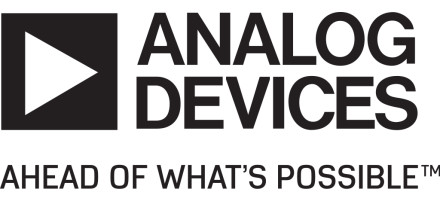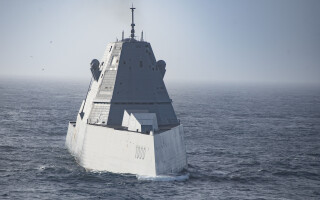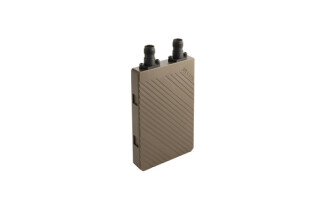EXECUTIVE INTERVIEW: Inspiring future women engineers, a defense industry challenge
StoryMarch 12, 2024

Recruiting female minds to pursue degrees in electrical engineering and to work in the defense industry is a challenge that needs to be addressed by industry and government, Maria Ho, Deputy Director for Government and Strategic Programs, Aerospace & Defense at Analog Devices Inc. (ADI), told me in my podcast. Maria says that recruitment needs to start at the high-school level or even earlier to inspire young female students to select engineering as a degree and career path. Government programs, industry internships like those offered by ADI, mentorship, and even popular culture all play a role in solving this problem, she notes. Maria also talks about her own career in engineering and the defense industry while also addressing key technology trends in military RF and microwave designs. Edited excerpts follow.
McHALE: Please describe your responsibility with ADI and your group’s role within the company.
HO: My group has a really unique role within ADI. We work strategically with the science and technology stakeholders in the government. For example, we engage directly with the DoD, the government labs, and other federally funded research and development centers. The idea is we want to provide them early access to technology and development platforms, so that they can prototype quickly and really aid in the technology transition for government programs. Having this early technology alignment also helps ADI accelerate and really tune our roadmaps for government applications. If there’s a listener out there in a government lab or an R&D center, we’d love to work more closely with you. I'm going to give my shameless plug: Please email us at gov.analog.com.
MCHALE: What trends are you seeing from your military customers in the radar and electronic warfare world in terms of requirements?
HO: First of all, we’re always looking for ways to lower SWaP [size, weight, and power]. But in addition to that, a lot of the other major trends that we’re seeing include wider instantaneous bandwidth, wider tuning ranges, moves to higher frequencies, higher SFDR or spurious-free dynamic range. And we’re also seeing higher power levels and higher operating temperatures for all the electronics.
One of the other big things that we are also seeing from the application side of things is more phased array, both digital and hybrid phased arrays.
MCHALE: Where is innovation happening in military application?. What are your engineers working on that we might see a couple years down the road in RF and microwave technology that’ll be a game-changer for the applications we talked about?
HO: Well, I can’t really disclose our future product roadmaps. But I can tell you that ADI is really working hard to address many of the trends that I previously mentioned. We’re working across multiple process nodes and technologies, so we can continue to improve performance while reducing SWaP. But you’ll also start to notice that we’re including more programmable hardened DSP [digital signal processing] functions in a lot of our latest solutions. That really helps to lower the overall solution cost and lower DC power consumption.
What we’re really trying to do is start to get some of these DSP functions in our overall solutions such as our mixed-signal front-end solutions that that have been recently announced.
MCHALE: Speaking of engineering innovation, you and I had a long conversation where we talked about how to expand the pool of engineering talent in the U.S., especially the pool of female engineers. How do you enlarge the pool? Does it start at the college level or should we go a bit earlier to their high-school years?
HO: I definitely feel that we need to target them earlier. As an industry, we really need to provide more deliberate opportunities, and even consider modernizing the curriculum and coursework at the high-school level, so that we can attract and expand the pool of engineers. For example, the eighth and ninth grade summers [are] an amazing time to target virtual or in-person opportunity so that young women start to get a feel for all the careers in engineering, and then also continue to keep their interest in math and science, so that they can pursue higher levels of math and science curriculum.
Now, continuing on that momentum towards the 10th and the 11th grade, one of the most crucial pieces is for young women to really have the access to real hands-on internships in specific fields of engineering, because they need that guidance as they are starting to pave their path towards college and beyond.
MCHALE: What is ADI doing to recruit engineering talent?
HO: ADI is doing a lot in this area. There’s a lot of different vectors. We’re very committed to investing in our people and their growth. So, we take different forms. For our normal recruitment, we utilize many of our university partnerships to attract the best talent from across the country. But we also have very focused and specialized partnerships with institutions, such as the University of Massachusetts at Lowell, where we actively recruit these students who are having more experience with the Analog Devices RF Microwave Learning Lab. We also have excellent partnerships with organizations that promote the advancement of underrepresented groups, so that we can attract diverse talent to ADI.
What’s near and dear to my heart is internships. ADI really has a cutting-edge internship program, not only at the college level, but at the high-school level. This is coupled tightly with a very strong mentorship program. So, when these programs are linked together, the combination really contributes to better recruitment, but ultimately, better retention success.
The long-term goal would be for us to be able to convert an intern into a full-time employee. Right now, we’re probably converting over 60% of our interns to full-time employees after graduation.
MCHALE: I’ve been in the defense industry nearly 30 years, and I think the number of women who are in senior positions – not just senior management, but senior engineering positions and young engineers – has definitely increased. But there’s still work to be done. In your career, what are the biggest challenges you faced as a woman engineer and as a woman in the defense industry? And how did you overcome them?
HO: Back in 2020 the entire world participated in [what turned out to be] the largest workplace flexibility experiment. We were all thrust into remote work environments. And it really proved that these work environments, being remote and hybrid, could actually be productive, and in many cases, more productive. [As] women we sometimes have added responsibilities. That requires additional flexibility [as] we may not be interested in compromising our career paths. These days I’m really excited that many of these organizations have flexible workplace policies that may not have existed in the past. But there’s still room for a lot of growth here.
One of the areas I feel that we as an industry really need to start thinking of improving is [regarding the] negative perceptions [applied to] someone who wants flexibility, [that] maybe they don’t want to climb up the career ladder or be assigned to the most interesting or challenging projects, which is typically not the case.
MCHALE: While there are many things industry and government can do to get young people more interested in engineering, often what inspires people toward a career is a personal connection with an engineer. Did you have an engineer or mentor who inspired you to get into defense industry or to be an engineer?
HO: Yes, actually, I did. When I was starting out, I was very grateful to have a female mentor who really guided me for years. She was not only a role model, but she helped me navigate my life from becoming a student, [then] becoming an employee. She guided me on how to grow within the organization. And she really personally empowered me to take chances. The one-on-one mentorship, that was priceless. It really helped shape my career.
Now, I have a little bit of a different pathway into defense: I actually spent the bulk of my career supporting the commercial industry. But there came a point where I was looking for a change in trajectory. I wanted to continue to learn. I wanted to be more challenged. But most importantly, what I was looking for was to be in an industry that was directly making a critical impact on society. That was the true inspiration for my transition to the defense industry.
MCHALE: I think that could be a good selling point to recruit young engineers into the defense industry – they can make an impact.
HO: Yes, absolutely. And that’s probably one of the [most fun] things about the job – that there is a direct connection to humanity. That’s what I was looking for and I urge many people out there whether you’re beginning your career, or you’re looking for transitions in your career, this is a great place to be.
MCHALE: So, Maria, we talked about how to reach young minds through high school [and] college, but is there a way we can reach them beyond school? How do we get the culture to address this challenge?
HO: John, that’s an excellent question. I really feel we have an opportunity to really expand the pool of engineers in our industry [and] our nation. We need to look at it from a broad awareness perspective. When I think about public awareness, I think about Hollywood, the media and the entertainment industry, the content creators out there. They can be using their platforms to grow awareness and highlight these diverse role models in the field of engineering. For example, I grew up in this generation of watching “ER,” where the backdrop was a hospital. That got me thinking that I wanted to go into the medical field. And then when I watched the original debut of the movie “Top Gun,” I imagined myself as a pilot. So, these images and these role models that that we see on the screen, they have a broad-based influence that could encourage people of all ages, all stages of life, all different backgrounds, to really pursue and consider engineering.
MCHALE: What advice would you give to a young woman trying to decide on engineering as a field today or even getting into the defense industry that you wish someone had given you all those years ago?
HO: When I think about this question, I say, okay, in hindsight, would I do this all over again? That’s typically the best way to think about it. And I would.
I would encourage every woman to consider majoring in electrical engineering. It’s a well-respected, well-paid field. It thrives on constant innovation. It offers you a tremendous amount of career mobility. Every industry uses an electrical engineer. It’s one of the most broad-based engineering degrees that you could possibly have because electronics touch everything around us.
Just as an example, in my semiconductor-ish industry you can design and you can manufacture chips, you can be involved with test and verification, you can develop and build entire electronic systems, and you can move on to business aspects like product and program management, even technical marketing and sales. The core elements of what you learn as an engineer really allow you to solve problems. You’re balancing tradeoffs, you’re making improvements, you’re innovating everything around you. There really are limitless career opportunities with an electrical engineering degree. There’s just no limit to where that education can potentially take you. It can be across industries, across different roles. The base of having an electrical engineering degree has been a huge, huge lift for me in my life and my career.
MCHALE: As you say, engineering can also lead you to other careers seemingly unrelated to engineering like marketing. Many of the folks I speak to in industry are in technical marketing, but have engineering backgrounds. No one else can talk the talk like an engineer. Correct?
HO: Absolutely. When you look at my career, I started out in a technical field and I’ve slowly migrated on to other aspects of the business. I think that that’s the way careers should be, or at least that’s a good avenue, because a lot of times when you’re starting out you may not know exactly what you want. This degree allows you to have that flexibility to kind of migrate and pave a path, pave your own personal path.
Maria Ho, Deputy Director for Government and Strategic Programs, Aerospace & Defense at Analog Devices







